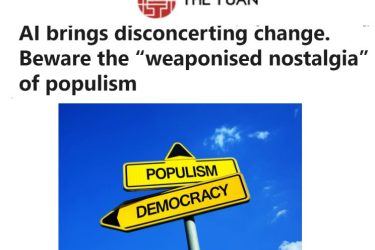Peviously on this blogpost…
In Part 1 we reviewed the concept of the Economic Singularity, and asked whether automation by machine intelligence will be different from previous rounds of automation. We identified three potential dangers – one for each of the coming three decades. In Part 2 we looked at the dangers in the 2020s and the 2030s. For this rousing finale we look at something that could go wrong in the 2040s. Read on…
3. The 2040s
The danger: the scenario of the Gods and the Useless
 It is the early 2040s. For some years, most people have been unemployed, living off a generous UBI funded by taxes on the profits of enormously profitable corporations which deploy impressive AI systems to produce goods and services with great efficiency.
It is the early 2040s. For some years, most people have been unemployed, living off a generous UBI funded by taxes on the profits of enormously profitable corporations which deploy impressive AI systems to produce goods and services with great efficiency.
In most ways, this new economy is a huge improvement on its predecessor. Contrary to the fears that permanently unemployed people would succumb to existential despair or boredom, they play, learn, explore and above all, socialise. Some of them spend most of their waking hours inside VR environments, but these are intensely social experiences, with huge numbers of people all around the world attending concerts, engaged in games, and creating new worlds collaboratively.
Even though very few people still have jobs, the new economy is still a variant on capitalism. Private property remains an essential institution, and people pay for the goods and services with the money they receive in the form of UBI. This means that the corporations which produce the goods and services receive accurate signals about what people genuinely value, and tailor their output accordingly.
The founders and owners of the corporations are stupendously wealthy. Few of the recipients of UBI worry much about this, since they enjoy a good standard of living – better than a middle-class American in the 2010s. Goods and services are cheap and very high-quality, and public infrastructure is well-managed and fit for purpose – thanks in no small part to the internet of things, which (for instance) enables structures to report obsolescence well before damage leads to collapse.
The rate of technological development has not slowed – in fact it has increased, driven by the exponential growth in the power of computers under what is still known as Moore’s Law, even though it has evolved. Until recently, the benefits of this rapid technological progress have spread quickly through the economy. Just as companies made far more money selling smartphones to the majority of the world’s population than they could have done by selling a few diamond-encrusted models to the super-wealthy, so genetic enhancements, nootropics and fancy digital devices have been quickly smeared across the economy.
The wealthy are aware that this is changing: the pace of development is becoming too fast, and new technologies are now supplanting each other before their predecessors are disseminated. This is most noticeable in technologies which enhance human performance, and in particular, their cognitive performance. The wealthy are becoming stronger, faster and smarter than the rest of the population, and the gap is widening.
Thoughtful members of the wealthy realise that this is going to become a problem. They increasingly avoid real-world contact with recipients of UBI, and meet them only in simulated VR environments where their growing difference can be disguised. They spend most of their time in protected enclaves whose whereabouts and whose astonishing defensive capacities are unknown to the rest of the population.
A small group of these wealthy people argue that a difficult choice is looming. The growing separation between the two classes of humans – the Gods and the Useless – cannot remain concealed forever. As they become a different species, this group believes, they will have to choose between explicitly dominating the rest of population, and eliminating them.
The happy scenario: Communal ownership of AI
Soon after the Austrian crisis and the global introduction of UBI, a small group of super-wealthy technology entrepreneurs began meeting to discuss the scenario of the Gods and the Useless. They were determined not to become an isolated minority within their species, feared and hated by the great majority of their peers. They devised a way to transfer their assets into collective ownership, mediated by the blockchain. This, they pointed out, was not socialism or communism, as it did not involve ownership by the state.
They unveiled their plan at the climax of an emotional farewell concert given by a band whose lead singer had recently committed suicide, and it caused a worldwide sensation. Most super-wealthy people immediately pledged to join the action, and they were hailed as heroes by the great majority of the world’s population, although a few isolated groups protested that it was trickery, or some kind of hoax.



